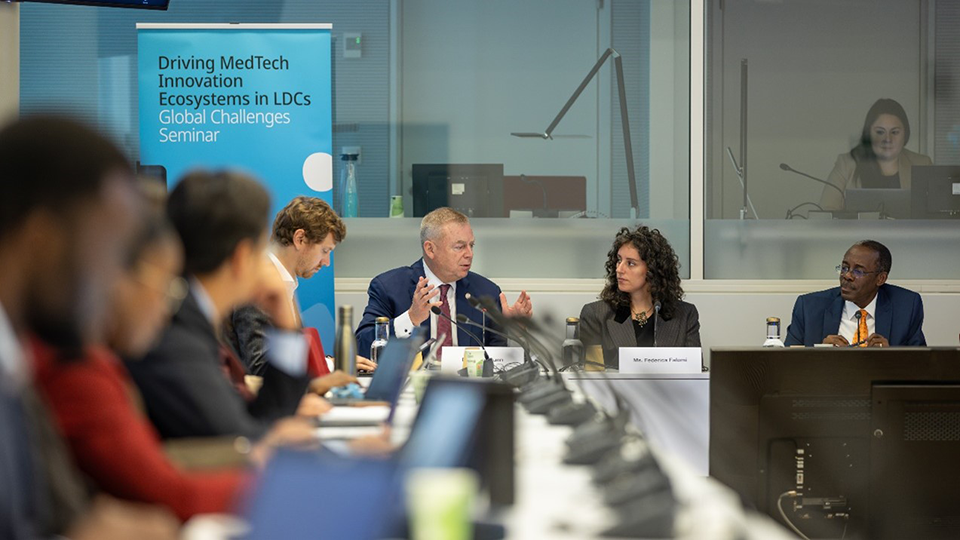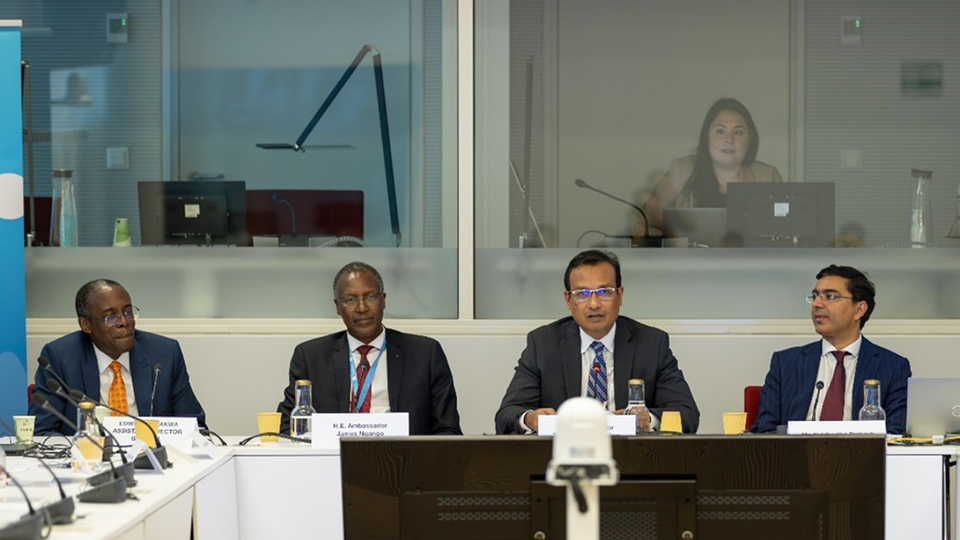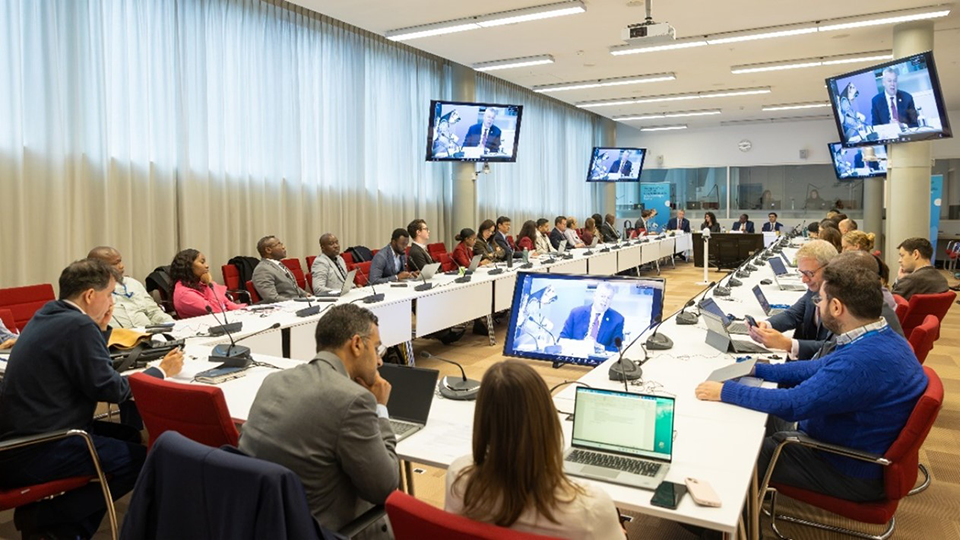Driving Action to Foster MedTech Innovation and Access in Least Developed Countries
October 14, 2024
A high-level panel of health sector experts from governments, industry, academia, NGOs and development banks gathered in Geneva and online to discuss the current drivers of advanced medical technology (MedTech) innovation and access in least developed countries (LDCs) and the role of intellectual property (IP) in promoting MedTech to address global health challenges. Organized by WIPO, in partnership with United Nations Technology Bank for Least Developed Countries (UNTB) and Medtronic (a global leader in MedTech), the seminar showcased learnings from an ongoing study that looks at strengthening the MedTech sector in LDCs.

Edward Kwakwa, Assistant Director General, Global Challenges and Partnerships Sector, WIPO, opened the discussion by emphasizing the impact of the COVID-19 pandemic on LDCs and highlighting the role of IP and innovation in supporting local and regional manufacturing of medical technologies. “We have joined forces with the United Nations Technology Bank for LDCs and Medtronic – a leader in MedTech – to study the conditions that are driving innovation in the MedTech sector within LDCs and, just as importantly, the barriers holding it back”, he said.
Ms. Federica Falomi, Economic Affairs Officer, UNTB, focused on the importance of leveraging technology and innovation to support the growth and development of LDCs. “This joint study points out existing challenges and concrete opportunities to boost MedTech innovation in LDCs. The UN Technology Bank remains committed to work with LDCs in enhancing access to essential medical technologies and building local capacities”, she noted, stressing that access to these technologies remains a major challenge in LDCs based on Technology Needs Assessments conducted by UNTB across LDCs in Africa and Asia.
Dr. Trevor Gunn, Vice President, International Relations, Medtronic, highlighted the potential of MedTech to improve quality of life and increase life expectancy. He explained that MedTech needs a wider reach so that not only doctors and engineers but also patients understand its lifesaving and life-improving potential. He also emphasized the importance of bringing LDCs into the conversation around universal health coverage to address non-communicable diseases (NCDs).
Fostering innovation in LDCs
H.E. Tareq Md. Ariful Islam, Ambassador and Permanent Representative of Bangladesh to the United Nations, Geneva, noted that IP is vital for developing an innovation ecosystem. The Ambassador highlighted the importance of information sharing and collaboration as well as supporting technology transfer, particularly since Bangladesh is set to graduate from LDC status in 2026.
H.E. James Ngango, Ambassador and Permanent Representative of Rwanda to the United Nations, Geneva, noted that WIPO’s support in fostering innovation, facilitating technology transfer, and improving IP enforcement will be essential for Rwanda to address barriers and fully harness the potential of medical technologies in healthcare.

Key findings discussed
Participants discussed the importance of leveraging technology and innovation to support the economic growth and development of LDCs, while also addressing the challenges faced by these countries in accessing and adopting new medical technologies. They also called for greater investment in research and development, as well as stronger IP frameworks that support innovation and access.
WIPO shared the findings of the joint research on the general state of MedTech in LDCs and discussed the multiple fields that impact the MedTech sector, including IP, regulatory systems, financial incentives, and multiple capacity factors such as scientific and technical education, medical training, and stakeholder awareness of IP.
The up-coming study highlights that there is a general lack of IP awareness in LDCs that results in lower IP filings and weaker enforcement mechanisms. It also highlights the importance of training and awareness programs and partnerships between the public and the private sectors to boost the MedTech ecosystem in LDCs.
Professor Khondaker Abdullah-Al-Mamun, on-ground research consultant based in Bangladesh, provided insights on the country’s alignment with the global MedTech ecosystem, mentioning the recent developments in its IP and regulatory frameworks. He identified innovation barriers such as the lack of venture capital, innovation funding, health insurance, and the underutilization of local talent, which contributes to brain drain. He concluded that advocating for the establishment of IP and technology transfer centers in universities to educate the youth would contribute significantly to growth of the country’s MedTech sector.
Dr. Jean-Pierre Hakizimana, on-ground research consultant based in Rwanda, discussed local MedTech manufacturing capacity, noting a heavy dependence on imports. The rising burden of NCDs, which in 2019 accounted for 48% of all deaths in the country, is another significant challenge. He further noted that despite the recent enactment of the 2024 IP law promoting innovation, barriers remain such as low awareness of IP processes, technical gaps in patent filing, and a shortage of patent attorneys in Rwanda.

Highlights from the Panel
During the panel discussion, Mr. Md. Golam Sorwar Bhuiyan, former Director, Bangladesh High Tech Authority, noted that while his country exports medicines to 168 countries, it imports 80% of its MedTech products from countries like India, Japan, and the United Kingdom. He stressed the need to establish a local MedTech industry to support the country’s population of 170 million people. Focusing on Rwanda, Mr. Christian Sekomo Birame, Director General, National Industrial Research and Development Authority, Rwanda, shared details about the country’s national innovation fund to support young innovators with seed funds and incubators for start-ups.
Mr. Jérémie Piton, Deputy Director, Technology Innovation and Product Development, FIND Diagnostics, explained the organization’s goal of reaching sustainability by working with manufacturers in LDCs, particularly during COVID-19. They addressed potential product mistrust issues that can come into play following technology transfer from a developed country to a developing country and shared examples of their work in rapid diagnostic tests, providing funding, technical assistance, and partnerships for technology transfer.
Ms. Carla Richetti, Med Tech Leader, International Finance Corporation, identified several challenges facing the MedTech sector, including high costs, limited access to finance, supply chain gaps, inadequate training, slow adoption of new technologies, and a weak IP ecosystem in some settings. Mr. Natnael Shimelash, Head of East Africa Biodesign, Rwanda, highlighted challenges around the lack of clear pathways for innovators in the early development stages and the nascent state of regulatory bodies. He emphasized the role of universities in boosting MedTech innovation through technology transfer, product development opportunities and capacity building.
Participants at the event emphasized the potential of MedTech to improve health outcomes and reduce poverty in LDCs. However, they also acknowledged the significant barriers that hinder the development and adoption of these technologies, including limited access to finance, weak IP ecosystems, and regulatory challenges.
About UN Technology Bank
The United Nations Technology Bank for Least Developed Countries was established as a subsidiary organ of the UN General Assembly in 2016 to support LDCs to strengthen their science and technology and innovation capacities.
About Medtronic
Medtronic is a global research and manufacturing firm that specializes in medical technology, services, and solutions.
About WIPO
The World Intellectual Property Organization, a specialized agency of the United Nations, works towards a balanced and accessible international intellectual property system that stimulates innovation and creativity.